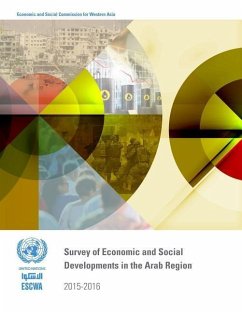Nicht lieferbar

Survey of Economic and Social Developments in the Arab Region 2020-2021
Realities and Prospects
Herausgeber: United Nations Publications
Versandkostenfrei!
Nicht lieferbar
The present study shows that the economic recovery that started in 2021 with 4.1 per cent growth for the Arab region is expected to continue at 3.7 per cent in 2022 and 3.6 per cent in 2023 for the baseline scenario, and 3.9 per cent in both years for the alternate scenario. The extent of economic recovery varies among Arab subregions and depends on the course of the pandemic, the speed of vaccination, dependency on oil revenues, tourism receipts, and levels of remittance inflows and official development assistance. For the Arab region as a whole, poverty is expected to decline from 26.94 per ...
The present study shows that the economic recovery that started in 2021 with 4.1 per cent growth for the Arab region is expected to continue at 3.7 per cent in 2022 and 3.6 per cent in 2023 for the baseline scenario, and 3.9 per cent in both years for the alternate scenario. The extent of economic recovery varies among Arab subregions and depends on the course of the pandemic, the speed of vaccination, dependency on oil revenues, tourism receipts, and levels of remittance inflows and official development assistance. For the Arab region as a whole, poverty is expected to decline from 26.94 per cent of the population in 2021 to 26.23 per cent in 2023, based on national poverty lines. The region made a slight improvement in closing the gender gap in 2020 but at the current pace of change needs 142 years to reach gender parity. Social protection systems in the region face severe shortcomings in coverage and effectiveness, particularly in countries with limited fiscal space and persistent political instability. Arab governments need to pursue tax reforms they initiated a while ago. Qualitative reforms should make tax systems fairer and more progressive, with simpler and more transparent administrative procedures for better tax compliance. At the national level, reforms should include redesigning tax brackets, rationalizing exemptions, introducing wealth or property taxes, and improving tax data. At the regional and international levels, enhanced cross-border tax cooperation is critical to coordinate tax incentives, review treaties and reinforce tax transparency.





